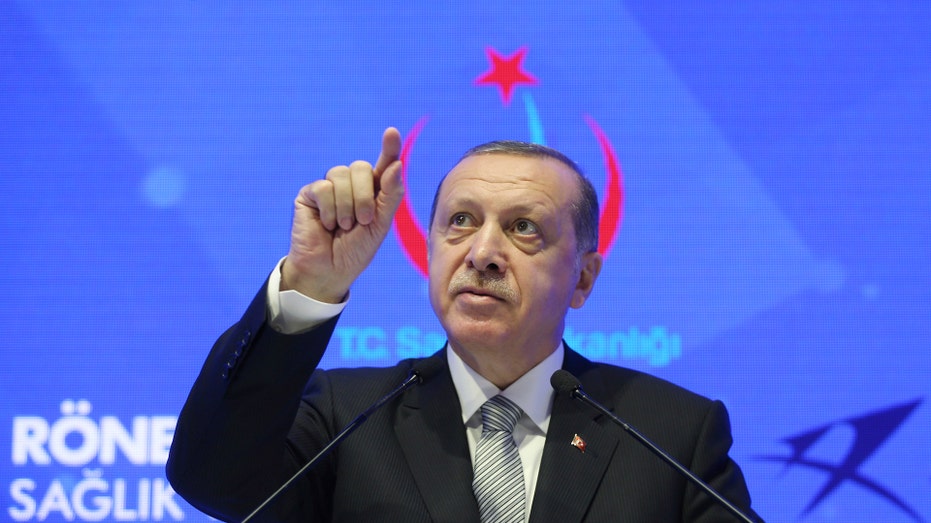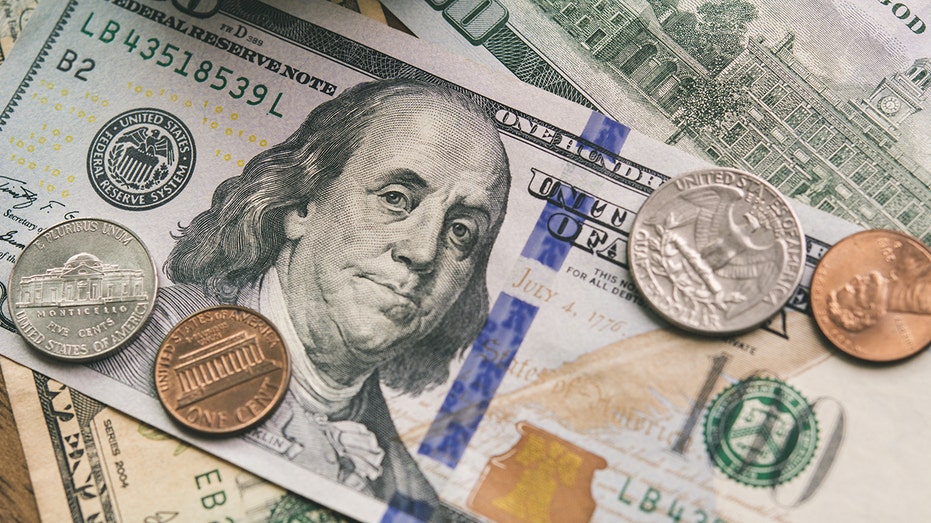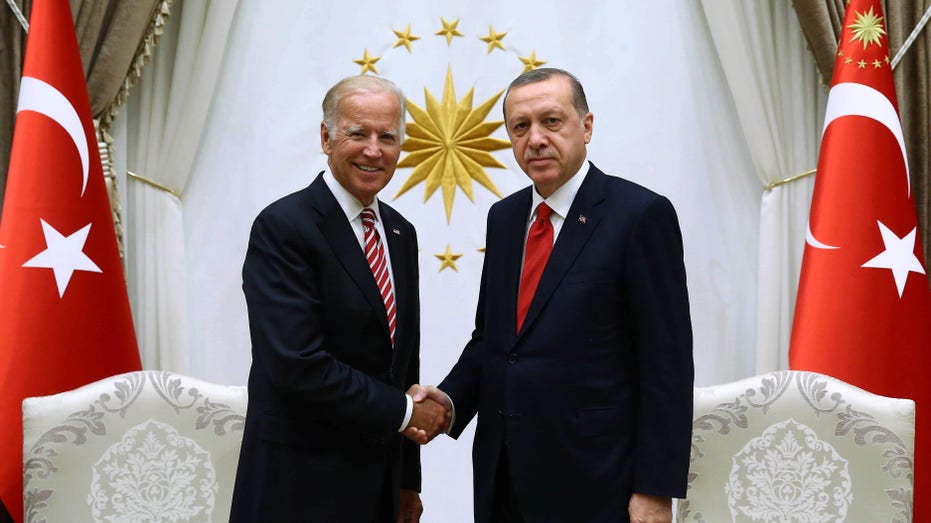Turks abandon the lira for dollars as currency crisis deepens
Riot police line streets in parts of Istanbul as country braces for third night of scattered protests over President Erdogan’s inability to stop precipitous currency decline
Fox Business Flash top headlines for November 26
Check out what's clicking on FoxBusiness.com.
ISTANBUL – A currency crisis here is battering Turks’ confidence in their government’s ability to manage the economy, causing droves of people to buy U.S. dollars and sending crowds of people into the streets to oppose President Recep Tayyip Erdogan’s policies.
Riot police lined the streets in parts of Istanbul as the country braced for a third night of scattered protests over Mr. Erdogan’s inability to stop a precipitous drop in the Turkish lira. The lira’s depreciation has undermined nearly two decades of economic gains that had lent Turks a sense that they were ascending into the world’s club of top economies.
Such protests have been rare since Mr. Erdogan concentrated power following a 2016 coup attempt, and local police said they had launched a legal inquiry into social media accounts that it accused of sharing "manipulative content" about the lira’s historic crash.
Police in Istanbul detained at least 55 people while clamping down on protests on Wednesday night, according to a local lawyers’ association.

Turkey's President Recep Tayyip Erdogan speaks during a meeting in Istanbul, Friday, July 21, 2017. (Presidential Press Service/Pool photo via AP)
Crowds of demonstrators near Istanbul’s Taksim Square chanted "Government resign!" as ranks of riot police looked on, during a protest planned for the International Day for the Elimination of Violence Against Women.
The Turkish lira’s rapid slide — 13% in one day this month and about 38% since the beginning of the year — resulted in a wave of Turks exchanging their liras for dollars, euros and other currency. Foreign currencies held by households in Turkish banks last week through Nov. 19 rose by nearly $1 billion, according to data released by the Turkish central bank on Thursday. About 59% of retail bank deposits are now in foreign currencies, up from nearly 57% the week before.
ERDOGAN RENEWS PROMISE FOR STRONG TURKISH ECONOMY BY 2023
Foreign investors and ordinary Turks have been fleeing the lira since Mr. Erdogan fired the previous governor of the Turkish central bank, Naci Agbal, for raising interest rates in March. Mr. Erdogan has removed a series of top officials who have prevented him from cutting interest rates in the past.
Mr. Erdogan has pursued an unconventional policy of interest rate cuts in the face of soaring inflation, which has reached 20%. Central banks generally raise interest rates to fight inflation, hoping to cool down demand for loans, but Mr. Erdogan and his political party have an ideological bias against high interest rates based in Islam.
"The banking sector is one of the strongest in Turkey. There are no problems, there is no distress," said central bank governor Şahap Kavcıoğlu, speaking after a meeting of a banking regulatory body on Thursday. Mr. Kavcıoğlu is a former official from Mr. Erdogan’s party whom the president appointed in March.

(iStock)
Mr. Erdogan defended his policies in a speech earlier this week, saying that Turkey is waging an "economic war of independence." The comments sent the lira down further. Turkish officials say they want a competitive exchange rate in order to encourage exports.
But even Turkish exporters have complained that the chaotic slide in the lira has made pricing difficult and driven up the cost of raw materials and energy.
The lira’s problems have weighed more broadly on the country’s corporate sector. Turkish companies reduced their foreign-currency deposits by nearly $1 billion last week, according to the central bank data, in a likely sign of weakening access to external capital.
"Even if you’re a strong Turkish corporate, this week has hardly been ideal," said Edward Glossop, an emerging-markets economist at Abrdn. Companies are likely using their cash reserves rather than getting new funding from capital markets.
BIDEN, ERDOGAN EXCHANGE CRITICISM AMID WORRIES WHITE HOUSE GIVING TURKEY THE COLD SHOULDER
The Turkish currency collapsed after the central bank bowed to pressure from Mr. Erdogan to cut interest rates to boost growth despite surging inflation. The most recent rate cut on Nov. 18 pushed Turkey closer to a full-blown economic crisis.
Turks have long kept some of their money in foreign currency deposits at Turkish banks. This tends to rise during times of economic stress. The high levels of foreign currency savings underscore the lack of confidence that locals have in their government’s ability to manage the economy.
The currency crisis has also sparked protests throughout Turkey as ordinary people saw much of their savings evaporate. Turkish opposition leaders renewed calls this week for an early election, accusing Mr. Erdogan of treason over his management of the economy.
"There is a huge credibility gap. This credibility gap is widening," said Omer Gencal, a former top executive at HSBC’s Turkish branch and Turkish banks. "People are not comfortable."
Discontent with the state of the economy is threatening Mr. Erdogan’s grip on power as even his core supporters are struggling with declining living standards. Recent opinion polls show Mr. Erdogan’s ruling coalition losing to an opposition alliance of political parties.

The currency crisis has spurred investors to flee assets issued by the Turkish state and companies. Demand hasn’t come back yet, according to debt-capital markets bankers. No Turkish sovereign or corporate bonds have been issued since September, according to data from Dealogic.
CLICK HERE TO READ MORE ON FOX BUSINESS
Turkish corporate bonds have sold off sharply in recent weeks, continuing even as the currency began to stabilize on Wednesday. The yield on a dollar-denominated 4-year bond issued by Isbank, one of Turkey’s largest privately-owned banks, rose for an eighth straight trading session on Thursday. It traded above 8%, the highest level in over six months. A similar bond issued by Turkish conglomerate Koç Holdings saw its yield climb to the highest point since March.
Even established companies will be avoiding international bond markets, said Uday Patnaik, head of emerging market debt at Legal & General Investment Management. "Your pricing will be much more expensive. It’s not the right time, you would have to wait until things calm down." He said companies are likely getting local bank loans or using cash reserves instead.
This article originally appeared in The Wall Street Journal




















